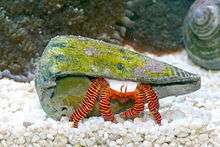Jacques Forest
Jacques Forest (June 14, 1920 – February 16, 2012) was a French carcinologist.[1]
Jacques Forest | |
|---|---|
| Born | June 14, 1920 |
| Died | February 16, 2012 (aged 91) |
| Nationality | French |
| Alma mater | University of Lille |
| Scientific career | |
| Fields | Carcinology |
| Institutions | Muséum national d'histoire naturelle |
Biography

Born in Créteil on June 14, 1920, Jacques Forest grew up in Maubeuge.[2] He served in the army for a year during the Second World War, and went on to study at the University of Lille after demobilisation.[2] After graduating, he worked for several years for the Office Scientifique et Technique des Pêches Maritimes ("scientific and technical office for marine fisheries"; now part of IFREMER); his early publications concerned a variety of fish species.[2] In 1949, he joined the Muséum national d'histoire naturelle in Paris, where he would remain for the rest of his career.[1]
In association with Jean-Louis Fage, Forest began working on hermit crabs, and rapidly became an expert; he described over 70 new species in the family Diogenidae, for example.[1] He also published on other Decapoda, including crabs and, most significantly, Neoglyphea inopinata, a living species of a group previously considered long-since extinct.[1]
Forest was also an enthusiastic field biologist, and took part in several oceanographic expeditions. He launched the MUSORSTOM expeditions in 1976.[1] He was also involved with the scientific journals Bulletin du Muséum national d'Histoire naturelle and Crustaceana.[1]
Forest retired on October 1, 1989, at the age of 69, and continued to be involved with the journal Crustaceana until 2003.[1] The Crustacean Society awarded Forest their Excellence in Research Award in 2008.[3] He died on February 16, 2012.[1]
Legacy
Taxa named in honour of Jacques Forest include:[4][5]
- Genera
- Forestia Guinot, 1976
- Pagurojacquesia de Saint Laurent & McLaughlin, 2000 (replacement name for Jacquesia de Saint Laurent & McLaughlin, 1999)[6]
- Jacforus Ng & Clark, 2003
- Species
- Lumbricalus adriatica foresti (Fauvel & Rullier, 1959)
- Sicyonia foresti Rossignol, 1962
- Thalamita foresti Crosnier, 1962
- Lembos foresti Mateus & Mateus, 1966
- Nematopsis foresti (Theodorides, 1967)
- Ventricolaria foresti Fischer-Piette & Testud, 1967
- Asymmetrione foresti (Bourdon, 1968)
- Brachynotus foresti Zariquiey-Alvarez, 1968
- Megachelione foresti Bourdon, 1968
- Brazilserolis foresti (Bastida & Torti, 1970)
- Cyathidium foresti Cherbonnier & Guille, 1972
- Haploniscus foresti Chardy, 1974
- Podocallichirus foresti (Le Loeuff & Intès, 1974)
- Paramunna foresti Carvacho, 1977
- Eucheilota foresti Goy, 1979
- Idmidronea foresti Buge, 1979
- Caryophyllia foresti Zibrowius, 1980
- Strengeriana foresti Rodriguez, 1980
- Alpheus foresti Banner & Banner, 1981
- Holothuria foresti Cherbonnier & Feral, 1981
- Leptochiton foresti (Leloup, 1981)
- Paralophogaster foresti Bacescu, 1981
- Periclimenes foresti A. J. Bruce, 1981
- Psilopsea foresti d'Hondt, 1981
- Nuculana foresti Metivier, 1982
- Platypodia foresti Serene, 1984
- Ethusa foresti Chen, 1985
- Eurysquilla foresti Moosa, 1985
- Processa foresti Noel, 1985
- Jolivetya foresti Cals, 1986
- Niso foresti Bouchet & Warén, 1986
- Arcoscalpellum foresti Rosell, 1989
- Forcepia foresti Lévi & Lévi, 1989
- Leucosia foresti Chen, 1989
- Lophopagurus foresti Zarenkov, 1989
- Porcellanopagurus foresti Zarenkov, 1989
- Trachycarcinus foresti Guinot, 1989
- Upogebia foresti Nguyen, 1989
- Alainosquilla foresti Moosa, 1991
- Ascorhynchus foresti Stock, 1991
- Lophopagurus foresti McLaughlin & Gunn, 1992
- Dromia foresti McLay, 1993
- Palaemonella foresti A. J. Bruce, 2001
References
- Danielle Defaye & J. Carel von Vaupel Klein (2012). "Professor Jacques Forest (1920–2012)". Crustaceana. 85 (7): 889–892. doi:10.1163/156854012X651727.
- Lucien Laubier (2002). "Jacques Forest, ou la passion des Crustacés" [Jacques Forest, or a passion for the Crustacea]. Crustaceana (in French). 75 (3/4): 195–201. doi:10.1163/156854002760095336. JSTOR 20105407.
- Colin McLay (2008). "Jacques Forest recipient of the Crustacean Society Award for Research Excellence". Journal of Crustacean Biology. 28 (2): 424–430. doi:10.1651/0278-0372(2008)028[0424:JFROTC]2.0.CO;2.
- Hans G. Hansson. "Prof. Jacques Forest". Biographical Etymology of Marine Organism Names. Göteborgs Universitet. Retrieved November 4, 2012.
- Peter K. L. Ng & Paul F. Clark (2003). "Three new genera of Indo-West Pacific Xanthidae (Crustacea, Decapoda, Brachyura, Xanthoidea)" (PDF). Zoosystema. 25 (1): 131–147. Archived from the original (PDF) on 2012-03-19.
- Patsy McLaughlin (2012). Lemaitre R, McLaughlin P (eds.). "Jacquesia de Saint Laurent & McLaughlin, 1999". World Paguroidea & Lomisoidea database. World Register of Marine Species. Retrieved November 5, 2012.